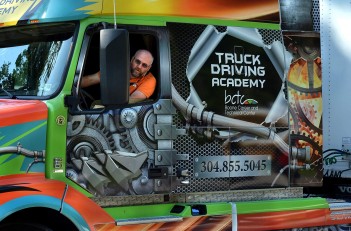
Mitch Vance, 38, of Harts, backs up a tractor trailer at the Boone County Truck Driving Academy in Chapmanville. Demand for truckers is increasing but the number of employees with CDLs is not keeping up with demand. Vance, who used to work at Home Depot, is taking the driving course to increase his income.
CHARLESTON, W.Va. — The trucking industry is facing a driver shortage that is expected to worsen over the coming years.
Jeff Foster, who runs the Boone County Truck Driving Academy in Chapmanville, said the root cause of that shortage is trucker retirement.
“Right now America is short about 30,000 truck drivers,” Foster said. “That number will go up to about 100,000 in the next seven years. The reason is, No. 1, driver retirement is probably the biggest cause of that. Back when drivers like myself started in the industry there was no such thing as a (Commercial Driver’s License). If you wanted to drive, you hopped in the truck and drove it.”
Before 1986, drivers weren’t required to hold CDLs, but a federal law aimed at making sure truckers, bus drivers and other big vehicle operators were qualified to do so changed that. Students at the Boone County Trucking Academy take part in a six-week program aimed at teaching them how to drive just about any big rig, including school buses, and then graduate with their CDLs.
“We take students, most of them have never driven anything bigger than a pickup truck, and when they leave here they’re licensed to drive anything but a motorcycle,” Foster said. “They’re not just limited to driving a truck. I don’t think there’s a county in the whole state not begging for school bus drivers.”
According to WorkForce West Virginia, about 5,100 jobseekers with CDLs Class A through D are looking for work. Of those, 1,300 are collecting unemployment, compared to about 13,000 total jobseekers seeking unemployment over the past two months.
Students in the trucking academy include laid-off coal miners. Foster said many of them aren’t necessarily looking for a career change, but they need more stability than the volatile mine industry can provide right now.
“Right now we are actually covered with laid-off coal miners,” Foster said. “The (National Emergency Grant) instituted by the federal government has really helped with that.”
About 80 percent of Foster’s students take advantage of that grant, which provides $5,000 to retrain laid-off workers in new career fields. Many of those students could have returned to the mines, Foster said, but choose not to out of fear of losing their jobs.
“Fortunately my business is booming because of the coal industry layoffs,” he said. “I hate that part, but I’m glad we’re here to at least offer them something to keep them in the state…





